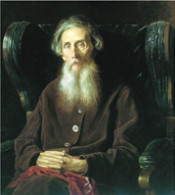
Birthday anniversary of Russian writer, lexicographer, ethnographer, physician Vladimir Ivanovich Dal
«I loved my Fatherland and gave it the best effort that I owed».
V. I. Dal
10 (22) November 1801 in the village of the Lugansk plant in Yekaterinoslav Governorate (now Lugansk), was born Russian writer, lexicographer, anthropologist, physician, creator of the "Explanatory Dictionary of the Live Great Russian Language" Vladimir Ivanovich Dal.
Father of Vladimir Ivanovich - Dane, who took Russian citizenship – was a versatile educated man: a linguist, theologian and physician; his mother was German, fluent in five languages, and gave her children an excellent education at home.
In 1814, Vladimir Dal was sent to Petersburg Naval Cadet School, where, according to the memoirs of Vladimir Ivanovich he "... killed the time until 1819 and graduated as a warrant officer. I was seasick at sea so that I could not serve, but as a punishment for a state-owned education I was supposed to serve, so I attempted, unsuccessfully though, to change to engineers, artillery". Having completed the course in 1819, Dal had served over five years in the Navy in Nikolaev city. During this time he began to write down the words unknown to him, thus he began the main cause of his life - the creation of Explanatory Dictionary of the Live Russian Language. According to Dal: "My occupation with the Dictionary was unconscious, it started in 1819 while I was learning the language and wrote down the words on my way..."
After retirement in 1826, Dal entered the Medical Faculty of University of Dorpat. Having successfully completed the course in 1829, he was sent to the army in the field during the Russian-Turkish war, where he worked in a field hospital as a surgeon-ophthalmologist.
After the end of the Russian-Turkish war of 1828-1829 Dal continued to serve as a military physician and epidemiologist. In 1831, Vladimir Ivanovich took part in a campaign against the Poles, and distinguished himself at the crossing of Vistula by General Ridiger. Dal was the first to apply electric current in firing a mine: he mined the crossing and blew it up after the retreat of the Russian division from the river. On his report to the commandment about the decisive action of divisional doctor Dal corps commander General Ridiger appended the following instruction: "For the present deed I instruct to nominate doctor Dal’ for the Order. Reprimand him for failure and deviation from his regular duties". Emperor Nicholas I awarded Vladimir Dal with the Order of the Vladimir cross in a buttonhole. After the war, Dal joined the St. Petersburg Military Surgical Hospital as a resident doctor.
From 1833 Dal lived in Orenburg, where he served as an officer on special assignments under the military governor of Orenburg Region V. Perovsky. The official duties required from him frequent travels over the province, which gave the writer an opportunity to explore the way of life and language of its people. For his collection of flora and fauna of the Orenburg province Dal was elected a corresponding member of the Academy of Sciences (1838).
In 1841 Vladimir Ivanovich moved to St. Petersburg and began working as a secretary and officer on special assignments to the Minister of the Internal Affairs; from 1849 to 1859 he occupied the post of the director of Nizhny Novgorod office.
At the beginning of 1860 Dal resigned, settled in Moscow and started working on a dictionary. In 1861, for the first editions of "Explanatory Dictionary of the Live Great Russian Language", Vladimir Dal was awarded with Constantin Medal by the Imperial Geographical Society, and later was awarded the Lomonosov Prize by the Academy of Sciences and was given the title of honorary academician.
September 22 (October 4), 1872 Vladimir Ivanovich Dal died and was buried in Moscow at Vagankovo Cemetery.
Among the works by Vladimir Dal there were essays, articles on medicine, linguistics, ethnography, poetry, one act comedies, fairy tales, stories: "Gypsy" (1830), "Russian fairy tales. Pyatok the first" (1832), "True stories and tall tales" (in 4 volumes, 1833-1839), an article in defense of homeopathy (Sovremennyk journal, 1838), "A word and a half on the current Russian language" (Journal Moskvityanin , 1842), "On beliefs, superstitions and prejudices of the Russian People" (1845-1846, 1880), "On the dialects of the Russian Language" (1852), "Pictures of the Russian way of life" (1861), "Proverbs of the Russian People" (1853, 1861-1862) - a collection of more than 30 thousand proverbs, jokes, puzzles, collections of stories "Soldier's leisure" (1843, 1861) and "Sailor's leisure" (1853), etc.
According to Dal’s memories: “…All my life I searched for an occasion to travel over Russia, to learn about people’s everyday life, believing that people represented a core and roots, while nobility was flower and mold… In spite of my lack of scholarship and knowledge the life itself familiarized me with the language in different ways: my service in the Navy, as a physician and a civilian, my handicraft occupation that I was fond of, all of this together has a large scope… there was not a single day I did no write down a speech, a word, an expression that would complete by stock…”
Lit.: Антонов Г. Адмирал русского слова — лейтенант флота Владимир Иванович Даль // Невский альманах. 2004. № 2 (15); То же [Электронный ресурс]. URL: http://www.nev-almanah.spb.ru/2004/2/admiral.shtml; Даль Владимир Иванович // Литературная энциклопедия. 1930. Т. 3; То же [Электронный ресурс]. URL: http://feb-web.ru/feb/litenc/encyclop/le3/le3-1404.htm; Даль Владимир Иванович: Собрание сочинений [Электронный ресурс] // Lib.ru/Классика. 31 мая 2004. URL: http://az.lib.ru/d/dalx_w_i/index.shtml; Козырь В. Владимир Иванович Даль // Вестник. 13 апреля 1999. № 8 (215); То же [Электронный ресурс]. URL: http://www.vestnik.com/issues/1999/0413/win/kozur.htm;
Based on the Presidential Library’s materials:
Даль В. И. Толковый словарь живого великорусского языка. М., 1903-1911. Т. 2;
Даль В. И. Толковый словарь живого великорусского языка. М., 1903-1911. Т. 3;
Даль В. И. Толковый словарь живого великорусского языка. М., 1903-1911. Т. 4;

